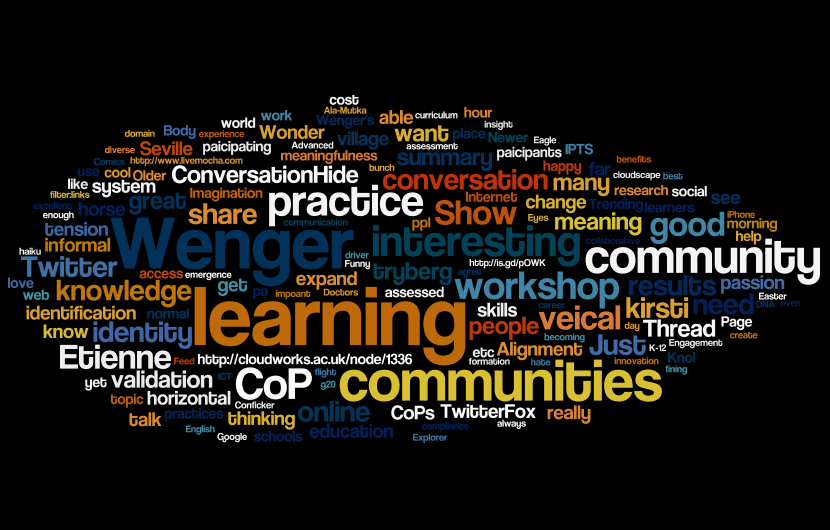Goerge Siemens has written an important post called ‘Systematization of education: Room for PLEs?’ Why do I think it is important? Because George tries to look at the relationship between the development and uses of technology and the societal organisation of education.
The crux of his arguement is: “PLEs are great. They’re just completely incompatible with the existing education system.”
George quotes Evetts, Mieg, and Felt who “suggest that expertise has as a significant sociological component. Power, authority, and validity all play a role. Focus on accountability, audits, and performance targets are now heavily intertwined with professionalism. Structures of control – such as education – are not solely about knowledge and the interaction of learners with academics. Education is a system based in a sociological context. Or, more bluntly, there is “no fundamental difference between the pursuit of knowledge and that of power.”
A PLE, in contrast, is a tool/process/concept that addresses the needs of learners. It is not, to date, integrated with the power structures of society. It is only – and perhaps even honorably – about knowledge. It’s entirely possible that an integrated power structure can be built at a grassroots level, thereby developing the capacity of PLEs to replace existing LMS tools (which again, find their strength in existing power structures of control and data organization under the umbrella of the institution). This transition will not, however, occur without a corresponding power shift that emphasizes networks as an alternative to hierarchical curricular control structures that begin with industry and government setting research agendas and often influencing standards and curricular needs.”
As George says: “The modernization of education: during the industrial revolution, education transitioned from a personal relationship between faculty member and learner to a systematized model of large instructional classes and numerous teachers.”
He concludes: “Education has ceased to be about the individual learner (the early university model) to being about the existing power allocation of society (today’s model as a by product of industrial techniques applied to education).
As a result, it makes perfect sense that LMS are popular. LMS’ speak the language of the current power structure in education: control, accountability, manageability.”
I agree with almost everything George says. But I am far less pessimist than him. I think George misses two things: the inherent contradictions in capitalist societies and the power of individual and collective agency.
Just as there are contradictions in the capitalist economic system, so are there in the different superstructures which support that system. Yes, education has become systematised to deliver the education and training required by modern industrial societies. But at the same time, the system is unable to keep up with what is required. It is not just a question that curricula cannot keep pace with the speed of technological and social innovation. It is an issue that the skills and knowledge required by today’s technology cannot be delivered through a rigidly sytematised, market led educational system. Furthermore, globalisation, the rapid turnover in employment and occupations and the implementation of new technologies have led to pressures for continuing learning – what is being called lifelong learning. Present education systems cannot deliver this. Hence the never ending reforms of our schooling systems and the ongoing financial problems of universities. Putting it simply, it will cost too much to extend the present model of institutional education to deliver the learning required by the present phase of capitalism. PLEs and MOOCs offer alternative models – for better or worse. Although institutions may resist such models, they will have little alternative than to embrace change.
OK – that is the first argument. The second is based on individual and community agency. The education systems are powerful. But they are not hegemonic. There have always been spaces for individuals and groups to organise their own learning in their own way. In the UK in the 19th and 20th centuries workers organised their own education through the Mechanics Institutes, just as today we find an increasing wave of self organised and open learning available through the web. There are many innovative teachers experimenting with new technologies. Often this work is going on on the fringes of the system, where the control may be less strong. Language teaching is one such example. Most language schools are only interested in results and if the teacher chooses to use PLEs or Web 2.0 tools then they do no object as long as the results are good. Today I was talking with Maria Perifanou, an Italian language teacher in Tessaloniki in Greece. She told me how her students are using Edmodo, set up as part of their langauge course, to communicate about what is happening in the riots. “They send messages, songs, links, express opinions… they used it these days to tell about their situation…in Italian…so this brought them their need to share opinions…to become a community.”
It is not merely a question that the system has to change before we can adopt Personal Learning Environments. PLEs support informal and social learning. It is that informal and social learning which can change the system. It is notable that the uprising in Greece is being led by students – many of whom are still at school.
We all can have agency in changing the system and the use of social software and the development of peer networks is part of that process.

